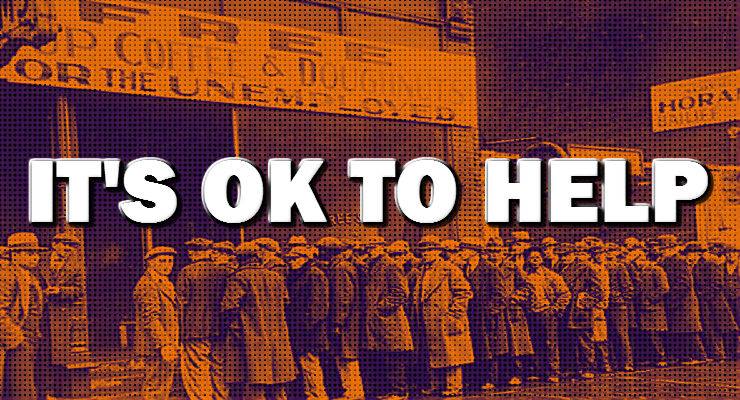
“A critique does not consist in saying that things aren’t good the way they are.
It consists in seeing on just what type of assumptions, of familiar notions,
of established and unexamined ways of thinking the accepted practices are based.”
-Michel Foucault
In social psychology, a stereotype is a thought that can be adopted about specific types of individuals or certain ways of doing things. These thoughts and beliefs, this perception, may or may not accurately reflect reality. That is, stereotypes could be a result of incomplete or distorted information accepted as fact without question. Due to the process of over-generalization within social perception, stereotyping leads to a great deal of inaccuracy in perception.
Let’s take the example of stereotyping poverty of individuals that receive food stamps: lazy, vicious, with low morals, without dignity and work ethic. That they are in a big way responsible of the economic crisis; as, for example, the “middle class” believes that they work for the “low class”. That the contributions they pay go towards feeding the receivers of food stamps.

Yet, rigorous sociological and economic studies indicate that these stereotypes and conclusions lend themselves to a superficial perception of the issue. Everything is perception but some are more informed than others. These studies show that the welfare system was not invented by the poor. It is meant to be a response to the state of poverty produced by the financial crisis characteristic of capitalist economies.
The workforce reduction in an economic crisis automatically and inevitably produces a level of unemployment that is not accidental but necessary to keep the system running. It is the one that permits to keep the workforce cheap. This reveals itself as strategy of the state and a systematic one.
There are two situations that the state has to control in times of economic crisis:
- the possible revolts that could come out of a shortage situation, out of the desperation of these people. The state needs to be in charge of this.
- that if money doesn’t circulate somehow and this population stops consuming, it also affects the economy, the commercial interest of corporations. There would be a population that is not consuming
Therefore, the food stamps money returns to the ark of those who have money: the commerce. The Supplemental Nutrition Assistance Program is a way of keeping the economy working; working for some, at least.
This is the focus based on the theories of Keynesian economics. The concept of welfare where the state supplies to the sector that stays marginalized by the same economy. This strategy is to conjure the effects of capitalistic over-exploitation alleviating a situation produced not by the “low class” but by the same nature of the economic system that has been adopted.
Stereotyping Poverty and Wealth
There are different ways of perceiving this issue, but the data and the facts are there. There is a big breach between the poor and the rich. This is an empirical reality, perceived by all.
Given that it’s not the poor that have control of the media, but the ones that exercise power, they have control of how we represent reality to ourselves. And the result is that we see the ones in power as successful, capable, divinely determined to be there … A mediated fascination that all sectors (“high class”, “middle class” and “low class”) aspire to.
The outcome? When reality bites us during economic difficulties and we want to put one culprit on the judgment stand, it’s easier to use the “low class” as the scapegoat and perceive them as the ones responsible for this reality. Here is when prejudices happen; something that has historically led to discrimination, persecutions… and exterminium.

dr samuel f. febres-santiago says
Excelente acercamiento al concepto estereotipo, con el cuál las sociedades modernas continúan la explotación de grupos marginados basados una definición o creencia incorrecta del comportamiento humano de los excluidos del poder.
Robert C. Gumbs says
This article is outstanding and more to the point it is true. We are a country almost split in half because of the great wealth that is being hoarded on the one side and the want and the depression on the other side. Right now some in the country hope to find a political solution to the gross inequality that we have in this country – let us hope that this will be the case. Frankly, I have fear that the masses may become to desperate and mistrustful to believe and trust in the political methods of this country. But time will tell.
As I said this is a very thougthful article – please always keep me in the loop.
Robert
felicia hernandez says
Great piece and right to the core of perception at its worse. If people were to educate themselves with the facts of why they the USA the land of the free most would understand why we have these systems in place like welfare and public housing or low income housing. We should definitely discuss this form of perception on class. Great article maestra
Steven Roberts says
Excellent observations,enjoyed reading your article.
Anna Znamenshchikova says
This is a wonderful article, Ms. Ortega! I absolutely enjoy your writing style and the way you make words dance so elegantly in every sentence. You are able to get your point across in a way that doesn’t scream at you from behind the screen. I loved it. Great job! :}
Suzann Caputo says
It is true that stereotypes and generalizations are only part of the truth and do not accurately reflect reality. How sad it is that these perceptions shape so much of our lives. This was a very thought-provoking article. It is refreshing to see an examination into poverty’s role in a capitalistic economy past the superficial level.
Elizabeth Cary says
Ms. Ortega also expresses herself brilliantly. She is on point. Excellent!
ERROL RILEY says
Very good writing style. More people need to understand the toils and snares of what you spoke about.